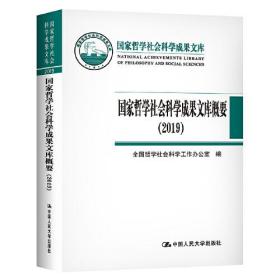
国家哲学社会科学成果文库 中国审美文化焦点问题研究
¥ 380 九五品
仅1件
吉林长春
认证卖家担保交易快速发货售后保障
作者韩经太 著
出版社人民文学出版社
出版时间2015-05
版次1
装帧精装
上书时间2024-10-11
- 最新上架
商品详情
- 品相描述:九五品
图书标准信息
- 作者 韩经太 著
- 出版社 人民文学出版社
- 出版时间 2015-05
- 版次 1
- ISBN 9787020108060
- 定价 108.00元
- 装帧 精装
- 开本 16开
- 纸张 胶版纸
- 页数 556页
- 字数 590千字
- 丛书 国家哲学社会科学成果文库
- 【内容简介】
-
中国古代美学思想具有若干复杂而深刻的核心问题,其中一些话题具有非常强大的延伸能力,旁浸其他领域,演变成为一种贯穿各个文化层面的内核。《国家哲学社会科学成果文库 中国审美文化焦点问题研究》选取其中最有代表性的九个焦点:道法自然、技道两进、玄圣素王、在事为诗、马乘飞燕、以形媚道、文心智术、吟咏涵泳、典型境界,展开的研究论述,剖析其内涵和特点,以期推动传统审美文化精神在现代社会的传承与发展。
- 【作者简介】
-
韩经太,汉族,1951年3月生,甘肃定西人。1984年吉林大学毕业,获文学硕士学位。北京语言大学原副校长。现任北京语言大学特聘教授,北京市哲学社会科学首都国际文化研究基地主任、首席专家,《中国文化研究》杂志主编。1991年荣获“全国优秀教师”光荣称号;1996年首批入选国家“百千万人才工程”国家级人选;担任教育部社会科学委员会委员、中国社会科学院《文学遗产》编辑委员会委员等。主要从事中国古典诗学与中国思想史研究,代表性学术论文集中发表在《中国社会科学》《文学评论》《文学遗产》等权威学术刊物上,其中论文《诗艺与体物——中国古典诗学的写真艺术传统》(《文学遗产》2005年第2期)入选国家教育部发起、高等教育出版社与德国施普林格(Springe)出版公司合作出版的全英文系列刊物Frontiers of Literary Studies in China (《中国文学研究前沿》2009年第4期)。出版专著10余部,其中《理学文化与文学思潮》(中华书局,1997年版)入选国务院古籍整理规划领导小组主编《中国传统文化研究丛书》第二辑。
- 【目录】
-
序论“问题意识”与基础理论创新
第一章道法自然:中国审美文化原论
引言美·尽善尽美·天地有大美
第一节道法自然:中国美学的逻辑起点
第二节自然之道:从《淮南鸿烈》到《文心雕龙》
第三节制器尚象:中国“艺术起源”说的文化底蕴
结语“人含其巧”的审美文化精神
第二章技道两进:中国艺术哲学的玄同思维
引言从“庄子的哲学是美学”说起
第一节同谓之玄:老庄玄思的语言哲学本质
第二节用心若镜:后“巫术”时代的“混沌”观念
第三节忘机与炫技:“至人”艺境的双重超越难度
第四节大音希声:无弦琴·一弦琴·长啸·《4分33秒》
结语清虚一本和道艺二元的契合
第三章玄圣素王:中国人格美学的布衣襟怀
引言中国人格美学的价值内核
第一节内圣外王:“天地大美”人格和“与道徘徊”意态
第二节玄圣素王:“处下”的人生观念与“让王”人格理想
第三节必也圣乎:孔儒“素王”人格及其历史批判理性
第四节圣之时者:孟子“四圣”说与集大成人格典型论
结语玄圣无为与素王删述的人格统一
第四章在事为诗:古代政治诗学与儒家风骨
引言历史逻辑与文学叙事
第一节政教诗学原论:历史回望与集大成阐释
第二节《诗》《春秋》之学:“王者之迹”与“学诗之士”
第三节在事为诗:汉人政治诗学的文化解读与历史反思
第四节兴讽当时之事:新乐府理论的思想风骨及其清虚化
结语“温柔敦厚”的老传统与“大音希声”的新境界
第五章马乘飞燕:古典造型艺术与适意写实
引言从“世界青铜之冠”说起
第一节图物与象物:图腾与教化叠合处的造型艺术觉醒
第二节“马踏飞燕”商榷:汉代铜奔马的现代命名问题
第三节“马乘飞燕”申说:实学思维与飞升想象的直觉统一
结语中国造型艺术的“适意写实”原理
第六章以形媚道:山水审美与诗画交融艺术
引言“绘事后素”与先秦技道参融的美学思想
第一节目送归鸿难:“实对”与“迁想”兼容的诗意画旨趣
第二节山水以形媚道:诗意的艺术哲学命题
第三节窥情风景:走向“诗中有画”的诗学轨迹
第四节以大观小:探询在“真山之法”与“人观假山”之间
结语古典诗情画意及其两端之妙
第七章文体与文术:古代文章学的本体构型
引言中国传统文学的文章学思考
第一节“智术”原论:刘勰的“智术”观与“人的自觉”
第二节以“心”释“神”:“神思”论与“畅神”说的同构语境
第三节天然出雕饰:“雕缛成体”和“自然之道”
第四节秉心养术:《文心雕龙》的“术”学体系
结语文体论与文术论互补的系统特征
第八章性情与心性:宋型文化语境中的诗学自觉
引言中国诗学本体论的历史生成
第一节“吾与点也”之意:“心源澄净”与“相忘于江湖”
第二节渊明风流:濂洛风雅视阈中的人格典型
第三节光风霁月:宋型文化视阈中的心性诗学意象
第四节儒家悲悯气质:理学集成思维中的诗家澄明境界
第五节词学“向上一路”:涵涉东坡词与梦窗词的专题讨论
结语中国诗学“理趣”与“逸品”艺术
第九章意象与意境:通观视阈下的美学中心范畴
引言必要的前提性认识
第一节“意象”阐释辨析:显隐意向与多维空间
第二节“意境”阐释脉络:从王昌龄“诗有三境”到王国维的“境界”
第三节阐释学主体意识:专用性与通用性的契合
第四节阐释学历史意识:穿越古代与现代的美学通观
结语文本的完整精读与概念的“丛集生成”
结论中国古典美学再阐释的当代意义
参考文献
Contents
Preface “problem consciousness” in the age of “basic theoretical innovation”1
Chapter 1Tao follows nature: the birth and origin of Chinese esthetic culture6
1.1Introduction: beauty, supreme beauty and the beauty of being6
1.2Tao follows nature: logical inception of Chinese aesthetics12
1.3The way of nature: from Huainan Honglie to Wenxin Diaolong39
1.4Making an instrument for observing the phenomenon: the cultural
connotations of the “origin of Chinese art”46
1.5Conclusion: the aesthetic culture of “man’s natural manifestation of art”57
Chapter 2Dual development of skill and Tao: the philosophy of art and the thought of profound unity60
2.1Introduction: from Zhuangzi’s “philosophy is aesthetics”60
2.2Unity means profundity: linguisticphilosophical nature of Laozi and Zhuang
zi’s metaphysical thought63
2.3Using the heart as the mirror: the conception of chaos in the postwitchcraft era78
2.4Forget the purpose and flaunt the skill: double transcendence barriers for the artistic level of the “perfect man”92
2.5The great sound of silence: nostringed zither, monochord, long yelling
(4′33″)108
2.6Conclusion: the agreement between the unitary principle of void and the duality of Tao and art127
Chapter 3The black sage and the crownless king: the aesthetics of Chinese personality and the spirit of being a commoner131
3.1Introduction: core value of the aesthetics of Chinese personality131
3.2Sage inner and king out: the “great beauty of being”and “travelling with Tao”134
3.3The black sage and the crownless king: the idea of “staying below” and the virtue of “conceding the crown”143
3.4Almost saint: Confucian “crownless king” personality and its reason of historical criticism153
3.5The saint who follows the time: Mencius’s theory of “four saints”and the personality of great consummation165
3.6Conclusion: personality unity of the inactivity of the black sage and the intellectual creation of the crownless king173
Chapter 4Poetizing on the occasion: ancient political poetics and Confucian
spirit180
4.1Introduction: historical logic and literary narrative180
点击展开
点击收起
相关推荐
— 没有更多了 —




























以下为对购买帮助不大的评价